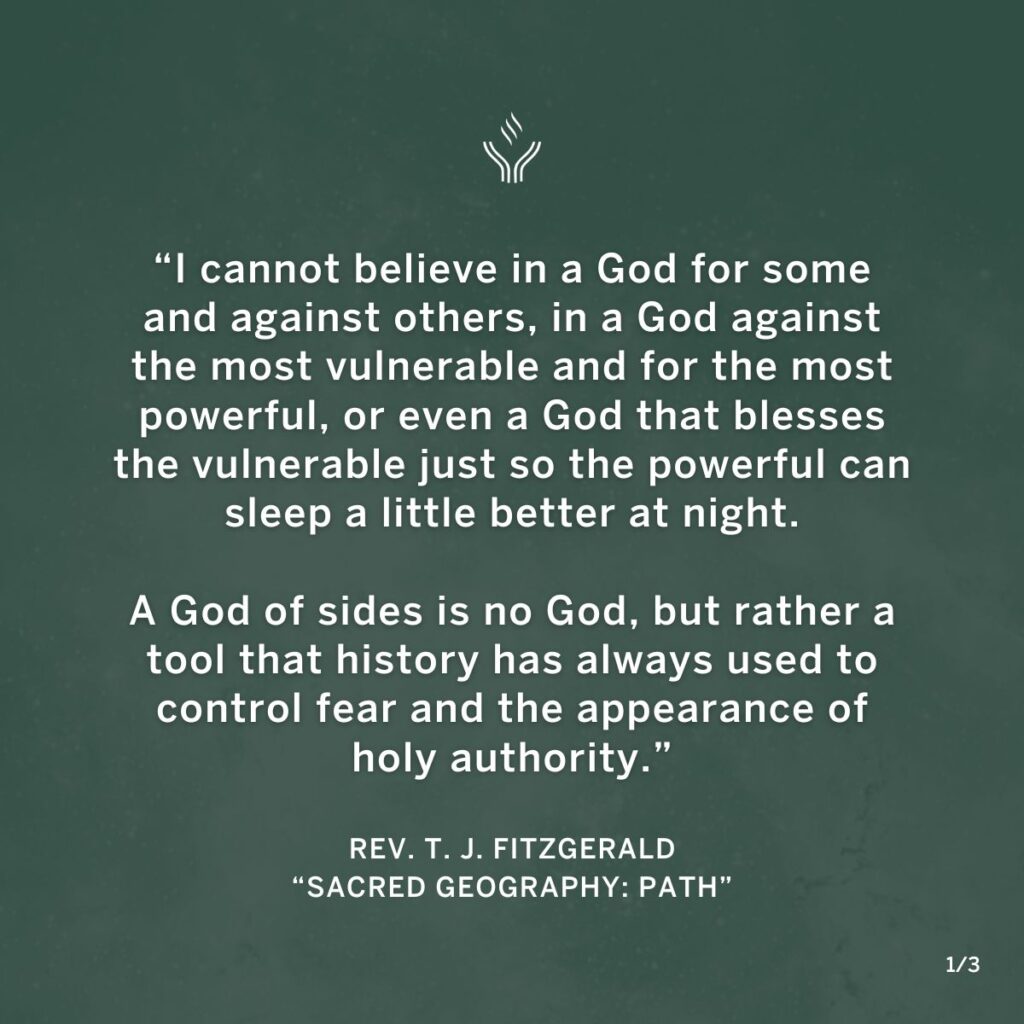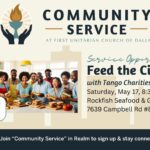Sacred Geography: Path | Rev. T. J. FitzGerald | 03.24.24

The paths to enlightenment are many. What is the Unitarian Universalist way? And how does it guide us toward the holy in our lives? This sermon is part of our Sacred Geography sermon series, where we are locating sacred touchpoints in our inner world and the world around us.

Importance of understanding one’s own faith journey
I may have mentioned once or twice in the past that I was raised in the Roman Catholic tradition and despite the many rules growing up, my parents went out of their way to make church and religious education a little more palatable for their precocious child. Which included having to teach confirmation class in order for me to be in confirmation class. But their creativity and their openness helped me stick with that faith just enough not to stray too far. The long groove of my family faith war in the vinyl of my life deepened slowly, gracefully even over time. Mostly, I didn’t really notice that, but there was a moment. I remember in high school time really looking back now when I sensed I might’ve been bound for something a little more than just a passing acquaintance with church.
It was that time in high school for me at least, maybe not for everyone. When I started to go to parties and things like that on Saturday nights when I had a bit of a looser curfew, let’s say, and on these nights it meant I’d often sleep at a friend’s house or they’d be sleeping at mine and I wouldn’t be feeling really churchy on Sunday morning, we’ll just say.
So knowing this and not encouraging this in anyone, I’m just telling you my truth. My friend and I would tell our parents, “Oh, we’ll just go to Saturday night service so we can sleep in on Sunday.” And then we actually went, I mean, seriously, no tricks, no leaving early, no trips to Perkins or Friendly’s. My friend and I went to church, sat in the pew right there together. We went through the rituals together. We had a little bit of a silly handshake when we passed the piece, and we actually still do today, but we didn’t make fun of it. We didn’t try to be cool. It’s hard to be cool in a Catholic church. We were kneeling and bowing together all that and praying aloud right next to each other. In truth, sometimes I would intentionally say, “Our Father.” Just behind him in rhythm to see if I could make him laugh in the middle of the prayer. But it wasn’t good or bad. It wasn’t terrible or great. It wasn’t life-changing or soul-crushing. It was just warm and easy and it was fine.
Actually. When I got here, I realized how similar these pews in this space are to those that were there. I remember that smell of polished oak when I knelt and bowed my head in prayer then, because it smells a lot like it does whenever I walk into this space.
I know now that those Saturday nights were the nights when my faith became my own. Faith can sneak up on you like that, and it helps to have a map at times, and that’s why here we want to help everyone here have a faith that is more clearly defined. It’s because we know how important a faith of your own is. We know that, and that’s why we created these services, these series of services throughout the year to explore, and deepen, and maybe hopefully delight in your own faith. And today we end our Lenten series, the longest series of the year about sacred geography, about the places and the kinds of locations where we find and experience the holy, where we find and live out the sacred in our lives, in ourselves as much as the world around us. Even when we’re not feeling particularly hopeful about the world.
Reflection on the story of Jesus’ entry into Jerusalem
We end this series with the idea of a path, our path. So it’s fitting that it’s Palm Sunday when we tell the story of the crowds gathering to welcome Jesus into Jerusalem, even when he knew that to go there meant danger.
Some call it a triumphant entry, and it is. Images of Jesus Christ’s Superstar and Godspell pop into everyone’s mind, I’m sure. Not just mine. It’s triumphant, that is certain, but for whom? In our text, from John, Jesus is said to be on an or on the colt of a donkey. Now, in Mark and Luke, he’s on a colt, which implies a horse, but in Matthew, he’s on a donkey and a colt and says that he rides them both and no one is entirely worked out how that happened, was it back and forth? Did he hold one, is really tall? No one knows. That wasn’t in the script, though. Sorry. The people on the roadside shouted, “Hosanna.” I always thought growing up, no one told me. I always thought Hosanna was like a generalized praise word, like I’m happy and I know it say, Hosanna.
But it’s not. Hosanna in Hebrew means, I beg you to save. It means, deliver us. That’s what the people are shouting and all the Gospels quote, the ancient texts saying, “Rejoice greatly.” The people are excited. The people are riled up about this leader come to town a Passover. The people are triumphant and exalted, but Jesus is not. He doesn’t say a word. He sees all this and he goes and he gets a donkey. And maybe he’s just trying to ride his donkey to church, which might be all this text is saying, this great lesson of Palm Sunday, be like Jesus and get your ass to church. All of you who clapped, I’m going to forward you the emails I’m going to get about that joke and you have to answer them.
But it tells us something about the faith of Jesus, not Christianity, the faith of Jesus. You think I’m a king, here is my ride. It’s a donkey. Now, he had some fans in Jerusalem, don’t get me wrong. He’d been healing the sick and feeding the hungry, giving people what they needed and what they wanted. He’d been handing out free universal healthcare and ready access to nutritious food. And that went a long way in ancient Israel too. I mean, if he came back and could get that passed through Congress, I’d have no choice to accept his divinity on the spot forever and ever. Amen.
Challenging the traditional theology of Palm Sunday
But even though he was popular, it was the donkey for him. Now, has anyone here ridden donkey? A lot more people in 9:30 rode donkeys. Okay, some people, no, you got me on this. Not quite like riding a majestic steed, is it? No. In the time of the gospels when they were written, and in many places in the Hebrew scriptures, donkeys appear, yo, there are a lot of donkeys in the Bible. I’m serious. You got a donkey in the Ten Commandments in Exodus about the Sabbath. Your donkey is supposed to get a day off too, by the way. And you got God making a donkey talk to Balaam in Numbers. It goes on and on. They’re everywhere. And historians tell us that a donkey in John’s time was actually pretty nice. It’s like a reliable, sensible Sedan today, there’s a lot of talk in churches about how humble it meant Jesus was to ride a donkey. And how this day shows how God can even glorify something lowly as a donkey. But guys, that is lazy theology, it’s just not true.
The interesting thing in this text isn’t the donkey, that was just there. It’s the response of the people. It’s the praise and the adulation that would normally be for a great leader or a hero that stands out. That reaction by the people is pure celebration at the person of Jesus and who they think he is, and what they think he can do right there on that donkey. And I hope you have not heard enough about donkeys yet because I’m just warming up.
The people are saying, “Hosanna, save us, deliver us.” And it’s hardly a wonder why. Life in first century occupied Jerusalem was not easy. The Roman Empire used every tool at their disposal to maintain order, and they wanted the poor to be living on the edge because they believed it’d be easier to control them that way. The more things change.
Then I was taught about the Christian scriptures in seminary. My professor Harry Attridge drove home to me how many people in that time were really on the margins. One injury, one small stretch of time not working. Losing wages for a day would threaten starvation in that family. Save us. They are saved. And I know that those cries fire in our hearts again. So many of us right now today, as children and families are being crushed by human-made starvation and human-made catastrophe in those same lands again.
I listened to one report this week by a mother watching her children so starved that they lack the energy to move about. She said she tries to boil any green leaves she can find, like weeds, into a stew only to stop the hunger pangs of her family. And then she said, of the stew, “Even the donkey won’t eat it.”
And our second reading Chesterton’s poem, he describes the donkey again like this, “The tattered outlaw of the earth of ancient crooked will starve, scourge, and deride me. I am dumb. I keep my secret still. Fools! For I had my hour, one far fierce hour and sweet, there was a shout about my ears and palms before my feet.”
The donkey is how Jesus was carried for a time. The poem calls it, “A mute animal that hears but cannot speak, an animal that is a parody of other creatures.” We hear how the donkey experienced a short hour of glory. It was so close to the praises. It was taking part in something miraculous for a time. It bore the people something they needed so badly in their lives, but it was only for an hour. And his best, that beast that carried Jesus, that held him for a moment has made that hour last across millennia. The donkey calls us humans, fools, who have held onto the thing, the thing that bore Jesus, the animal that shared an hour that cannot speak to us at all, as something to praise and to honor to hold up today.
I think this poem is telling us to be on guard with our faiths, friends, not only our religious faiths, but faiths in things in this world. Faiths in politicians, in political parties, faith in movements, faith in friends sometimes in institutions, maybe even in churches that may once have carried a deep and certain truth, but have ambled, ambled through time to us. And now may only scream a shrill call that is a mockery of the first great truth it spoke.
In this case, the stories we inherit about Jesus. And that’s an important preposition. The stories are not Jesus. They are about Jesus. The stories are only blood moon shadows that eclipse the truth of Jesus’s message, which was always, always, always love for all children, for all people, for we are all neighbors.
Now I know the Unitarians, we have a reputation, I’ve heard people say of our faith, of this faith that holds Jesus was man, that we are inherently good and that salvation comes not from on high, but from how we live our lives. That this faith is not powerful enough that with no clear divine loving presence like Jesus to hold us, that there’s something missing from it. But there is a holy presence here, friends. It is a presence whose power though, does not fit into the parking space I want. It doesn’t fret over the wars of the world. It may not even care if the seas boil. These are human concerns, bound inextricably to time, and space, and really bound to fear. If there is anything, a divine presence must be, it is to be unshackled unbound from our human concepts of time and must be unafraid, goes into the heart of the man-made perils.
Rejecting the notion of a God who favors the powerful over the vulnerable
And at the same time, the same time, I won’t hold with faiths that believe that the horrors of the world are simply God’s will. Because if that’s the case, then the God of those faiths wants children to starve on food unfit for donkeys. And I won’t do it. I won’t. I cannot believe in a God for some and against others, in a God against the most vulnerable and for the most powerful or even a God that blesses the vulnerable just so the powerful can sleep a little better at night. Then leaves the tempest tossed to despair and predation. A God of sides is no God, but rather a tool that history has always used to control fear and the appearance of holy authority. And I call any faith that does that well, a donkey’s faith. It’s a parody of true faith.
The faith that Jesus practiced when he gathered the loathed and forgotten and made them his family, when he proclaimed interconnectedness as truth by saying, “What you do to the least among you, you do to me.” While people shouted, “Save us.” And he took the path into the mean heart of man-made power when he knew he was as doomed as the people who shouted, “Hosanna,” that he would soon perish. That, that is the holy presence among us here. No promise of harps and angels just faith off script and without a net, it is in the holy acts of risking for the common good that our religion lies. And among the holiest acts is to choose our path in this life with care guided by the highest virtue, which is the flourishing. The flourishing of all. And we know fully the truth. God may be able to move mountains, but you better bring a shovel, right?
For Jesus, the shouting of praises will echo soon as curses in his ears from outside his prison cell. His chosen family will turn from him, unable to bear any longer the weight of their relationship and the danger that relationship holds. But today, in this moment, the scent of the palms torn from the trees smells different, crisper somehow, than those palms cracking under the donkey’s hooves. They’re fresh, clean, and crisp, tear one off for yourself and smell. The path was laid. The path was laid by the true prophets of love and flourishing before Jesus, before nations, before borders or walls, certainly before kings or presidents or any donkey trod upon it. The path was there and we do not know where it started or where it ends for us. But if you take it. If you take this path, please remember the spot. Notice the time, the place where you made your faith. This true faith, your own. Not held up by some mute shadow, but a sacred place, a sacred geography you traverse with your faithful friends beside your faithful companions.
Who knows? It could look like a spot where two friends kneel on a Saturday night before anything really important happened. And notice how the branches smell a little like polished oak as they bow their heads together with prayers and their mouths of daily bread, and they relinquish the kingdom, they surrender the power and they give back the glory. They give it up forever and ever. Amen.







